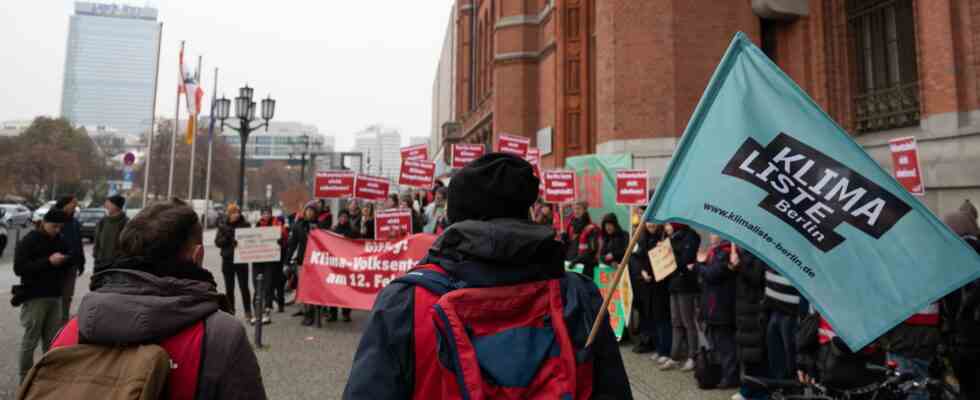analysis
Status: 01/12/2023 3:47 p.m
A citizens’ initiative wants to put pressure on Berlin for more climate protection. But even before the “Climate Neutral 2030” referendum is even on its way, even the proponents are already doubting its feasibility.
The traffic pushes its way sluggishly through the morning darkness. Cars at walking pace, interspersed with an overcrowded Berliner Verkehrsbetriebe bus that has to switch from the blocked bus lane to a traffic jam. In the rush hour on Berlin’s Sonnenallee, keywords such as “transport turnaround” or “climate neutrality” seem light years away.
Climate Minister Robert Habeck has just described the transport sector as the “biggest problem for climate protection”. In other words: in a city like Berlin, it is a major stumbling block for the project to become climate-neutral. Many political forces in the capital want more climate protection, the Greens campaigned years ago with the plan to make the city within the huge S-Bahn ring combustion-free.
Policy date finding
But in the red-green-red city government, the really big climate protection ambitions seem to have given way to realism. That should be one reason why a citizens’ initiative made up of environmentalists wants to get the government moving. “Berlin 2030 climate-neutral” is the title that the initiators want to make the measure of all things by referendum. A booster for climate policy, so to speak, in which environmental critics see little movement despite big words. Left frontman Klaus Lederer admitted in December that he was annoyed that “the dynamics of this referendum were underestimated” in the Senate.
Mayor Franziska Giffey (SPD) now suspects the explosive nature of a city that tends to be revolutionary when it comes to referendums. This shaped the debate about the date of the citizen survey. It will not take place on the day of the House of Representatives elections on February 12, as is obvious, but in an additional ballot on March 26. After the breakdown election of 2021, the sole reason was concern for a smooth election to the House of Representatives, assured an annoyed Governing Mayor in December.
Problem: A referendum for quick climate protection would be binding for politicians. The goal of climate neutrality by 2045 set in the Berlin Energy Transition Act of 2021 would be brought forward to 2030. However, those responsible for politics believe that becoming climate neutral in less than seven years is by no means achievable. Giffey is promoting her ideas, which have already gone beyond national and European plans to reduce CO2 emissions by 55 percent by 2030. “We in Berlin want to do this as quickly as possible and are aiming for a 70 percent reduction by 2030 and a 90 percent reduction by 2040,” said the SPD politician.
Climate activists are increasingly strangers to the Greens
The co-governing Greens are asking for understanding that the radical goal of climate neutrality by 2030 is completely unrealistic. “We, including myself personally, would like to do everything we can to become climate-neutral as quickly as possible, preferably before 2045,” said Environment Senator Bettina Jarasch. “But we cannot legally promise something that we are not sure we can implement.”
In the debate about the referendum, from the point of view of the Green politician, there is too much discussion about legally stipulated target figures and too little about concrete measures to achieve the goals. She thinks it makes more sense “to do everything that can be done technically, practically and politically so that we can become faster,” says Jarasch.
These tones, especially from the Greens, are increasingly alien to the climate activists in the capital. “The Berlin government, including the Greens, lacks the political will to take the necessary action,” says Stefan Zimmer, who initiated the referendum. “History has shown us several times – with the moon landing or most recently with the construction of the LNG terminals – when the political will is there, the unthinkable becomes feasible.”
Environment Senator Jarasch (pictured in front) is also critical of the planned climate referendum.
Image: dpa
CDU walks a fine line
But with bold visions it is such a thing in election times. On February 12, the parliamentary elections will be repeated, in the city-state a vote of the same rank as a state election. The CDU would be only too happy to snatch the office from the governing mayor. It is important to walk the fine line between criticism of the left-green alliance and socially desired climate policy.
The criticism: The Senate made up of SPD, Left and Greens have done little since 2016, especially in the important building sector. “Instead of setting an example, the Senate has just installed photovoltaic systems on around twelve percent of public roofs,” notes CDU state chief Kai Wegner. “The SPD, the Greens and the Left make far too little use of the opportunities offered by companies, start-ups and science. I rely on attractive funding programs and openness to technology.”
It is already clear here that the CDU, should the attack on SPD mayor Giffey succeed at all, will almost certainly have to deal with the traditionally strong Greens in Berlin. However, the Greens could also lose their feathers in their own camp if too much climate protection falls by the wayside. Clearly visible, for example, in the morning rush hour on the capital’s busy axes.

